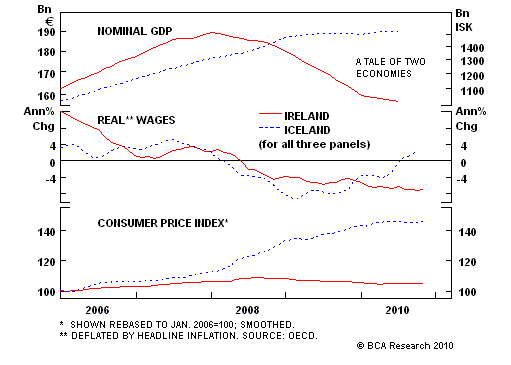© Markets & Beyond |
In any crisis, one can become depressed and see the glass always half empty and not learn lessons, continuing the same mistakes or inventing new ones, even worse. One can also learn from past mistakes and improve.
The financial crisis taught us a few things which were hidden deep within its foundation due to a flush of liquidity, low interest rates, deflation imported thanks to industrial delocalization and the absence of control:
- The Euro is a political currency, not an economic one and will fail if the latter does not dominate the former; please understand me, I do not wish the fall of the Euro, I am just explaining the inevitable if politicians in Europe continue to act blindfolded for the sake of the Eurozone and EU enlargement for themselves.
- Behind the smokescreen of European solidarity, European countries are participating in rescue plans to save first their banks, second the countries which are bankrupt, not the other way around (why do you think the UK is participating in the bailout of Ireland and not the one of Greece?). Without banks at risk in France and Germany, I doubt we would have witnessed such bailout, in particular Ireland that most European politician abhor (too low taxes to their taste and a former economic success, not like Greece – Europe prefers cheaters).
- The root of the crisis is not addressed with the past and yet to come rescue packages: the one-fits-all does not work without the loss of sovereignty on fiscal and social policies, i.e. the end of sovereign states in Europe – if you don’t control your fiscal policy, you are no longer independent.
- Without a mechanism of automatic sanctions, strong enough to discourage Government not to abide by the convergence criteria (60% debt/GDP, 3% budget deficit), there is no way the Eurozone can work; past experience has demonstrated the lack of courage of politicians in front of voters.
- The all idea of economic convergence behind the Euro has in fact witnessed the contrary with a competitiveness gap increasing between the North and the South of Europe. The rescue packages extended to Greece and Ireland are not solving anything, just adding debt to already overly indebted countries and plunging them into a deflationary spiral making these debts even more difficult to service despite artificially low interest rates. Oh! Yes, we are gaining a few years, as if it were be enough.
“Iceland and Ireland experienced similar economic illnesses prior to their respective crises: Both economies had too much private-sector debt and the banking system was massively overleveraged. Iceland’s total external debt reached close to 1000% of its GDP in 2008. By the end of the year, Iceland’s entire banking system was crushed and the stock market dropped by more than 95% from its 2007 highs. Since then, Iceland has followed the classic adjustment path of a debt crisis-stricken economy: The krona was devalued by more than 60% against the euro and the government was forced to implement draconian austerity programs. In Ireland, the boom in real estate prices triggered a massive borrowing binge, driving total private non-financial sector debt to almost 200% of GDP, among the highest in the euro area economy.
In stark contrast to the Icelandic situation, however, the Irish economy has become stuck in a debt-deflation spiral. The government has lost all other options but to accept the €85 billion bailout package from the EU and the IMF. The big problem for Ireland is that fiscal austerity without a large currency devaluation is like committing economic suicide – without a cheapened currency to re-create nominal growth, fiscal austerity can only serve to crush aggregate demand and precipitate an economic downward spiral. The sad reality is that unlike Iceland, Ireland does not have the option of devaluing its own currency, implying that further harsh economic adjustment is likely.”
The graph below exemplifies the result of both policies: the winning one is quite obvious…
The major mistake made by Ireland in 2008 was to guarantee the debt of Irish bank.
I disagree with the ECB and many European politicians who do not want bondholders to participate in mending the current crisis: bondholders must take a haircut in a package designed to manage an orderly default of at least the PIGS countries, like any investors they must pay for their wrong analyses and bad investments. It is how capitalism successfully works. The taxpayer should not pay for the private sector.
Politicians and others at the ECB fear that investors would not invest again in European sovereign debt? Bullshit; investors have short memories, and more importantly, good investors are able to do their own analysis of risk/reward profiles; offer them an interesting story and they will invest, otherwise reform yourself to present such a story.
Banks are going to be under pressure? Yes, and so what? They would need additional capital? Ok, raise it with shareholders. Probably unsuccessful due to the sheer size? Sell assets. Not enough? Sell yourself. OMG! We are going to risk loosing control of “national” banks; we can’t do that! Ok, get the taxpayer to become shareholder and get rid of the Management and the Board, then sell back to the private sector at a profit.
I continue to believe that we should not test the German resolve to act as taxpayer of last resort, otherwise Germany will take its currency back accompanied by the virtuous Europe (and France will not be part of it) – just look at the trade balance GDP growth, unemployment, etc. to figure out.
Source:
BCA Research: Iceland, Ireland And The Role Of The Currency
http://www.bcaresearch.com/public/story.asp?pre=PRE-20101202.GIF







